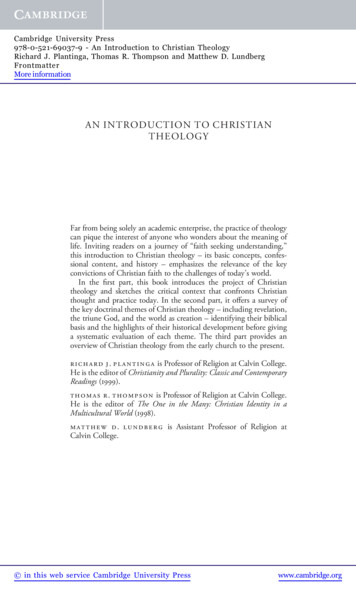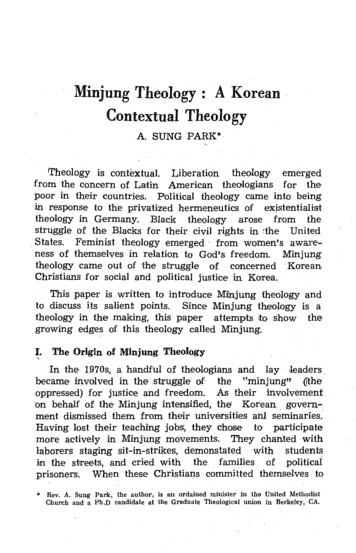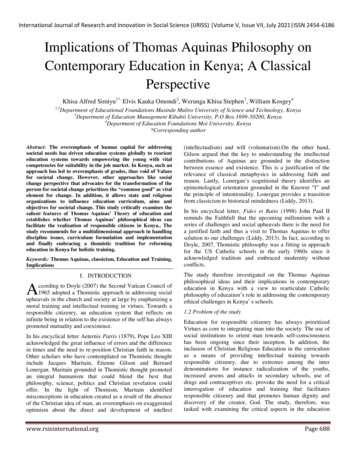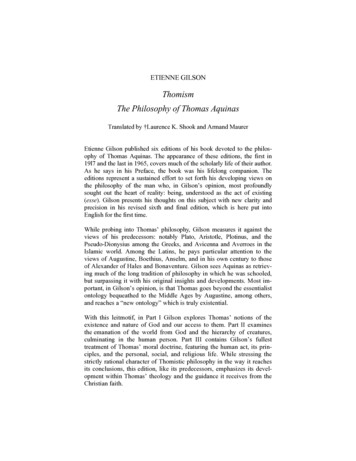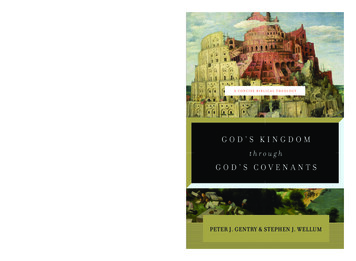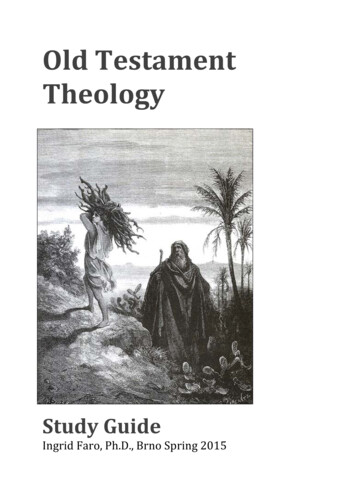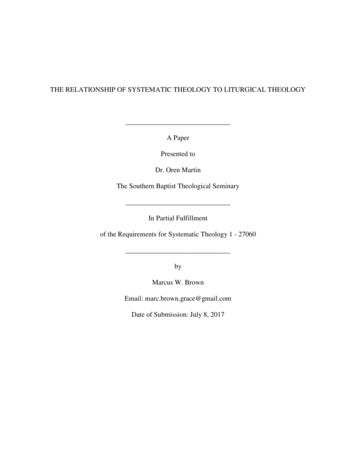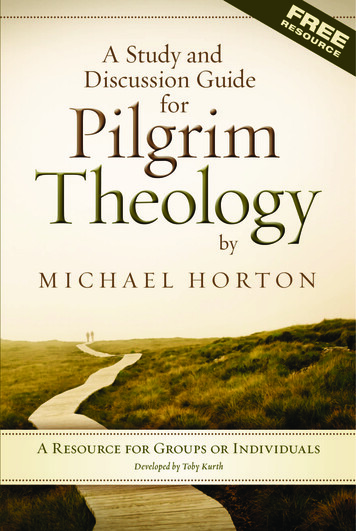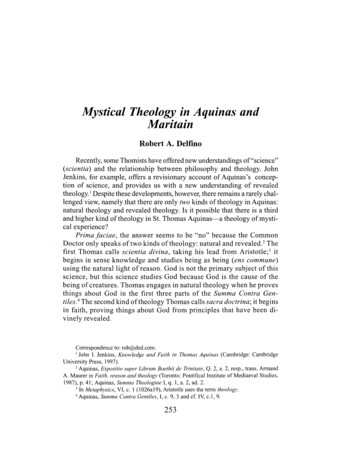
Transcription
Mystical Theology in Aquinas andMaritainRobert A. DelfinoRecently, some Thomists have offered new understandings of"science"(scientia) and the relationship between philosophy and theology. JohnJenkins, for example, offers a revisionary account of Aquinas's conception of science, and provides us with a new understanding of revealedtheology. 1 Despite these developments, however, there remains a rarely challenged view, namely that there are only tvvo kinds of theology in Aquinas:natural theology and revealed theology. Is it possible that there is a thirdand higher kind of theology in St. Thomas Aquinas-a theology of mystical experience?Prima faciae, the answer seems to be "no" because the CommonDoctor only speaks oftwo kinds of theology: natural and revealed. 2 Thefirst Thomas calls scientia divina, taking his lead from Aristotle; 3 itbegins in sense knowledge and studies being as being (ens commune)using the natural light of reason. God is not the primary subject of thisscience, but this science studies God because God is the cause of thebeing of creatures. Thomas engages in natural theology when he provesthings about God in the first three parts of the Summa Contra Gentiles.4 The second kind of theology Thomas calls sacra doctrina; it beginsin faith, proving things about God from principles that have been divinely revealed.Correspondence to: rob@ded.com.1John I. Jenkins, Knowledge and Faith in Thomas Aquinas (Cambridge: CambridgeUniversity Press, 1997).2Aquinas, Expositio super Librum Boethii de Trinitate, Q. 2, a. 2, resp., trans. AnnandA. Maurer in Faith, reason and theology (Toronto: Pontifical Institute of Mediaeval Studies,1987), p. 41; Aquinas, Summa Theologiae I, q. I, a. 2, ad. 2.3In Metaphysics, VI, c. I (l 026a 19), Aristotle uses the tenn theologr.4Aquinas, Summa Contra Gentiles, I, c. 9, 3 and cf. IV, c.l, 9.253
254RoBERTA.DELFINONot only does Thomas not discuss any other type of theological science, 5 he says that revealed theology is the highest science there is 6 and thehighest wisdom. 7 Even God's knowledge, although it is a higher form ofknowledge, does not properly speaking constitute a science because it isnot discursive. Moreover, Thomas says that the principles used in revealedtheology come from God's very own knowledge which He shares with theblessed; 8 as there is no higher knowledge than God's, what would a highertheology use as principles?Despite these difficulties, and by relying on Thomas's own principles, Iargue that another type of theology is implied by Thomas's views. I thenbriefly outline the nature of this science, which I propose to call "mysticaltheology," and discuss both how it is distinct from other sciences and whatplace it has among the other sciences. Jacques Maritain also discussed mystical theology drawing upon Aquinas, St. Teresa of Avila, and St. John of theCross, in his famous work The Degrees of Knowledge. 9 Later on I evaluateMaritain's conception of mystical theology, discussing some of its meritsand deficiencies. 10IThe traditional interpretation of Thomas's conception of science is thathe followed Aristotle's lead both in regards to his understanding of the nature of a science and in how the sciences are distinguished from each other.(This view has been challenged by Jenkins, but his view does not jeopardizemy conclusions. 11 ) Aristotle had listed several conditions of a science, some5Thomas does mention civil theology (theologia civilis) and mythical theology (theologiafabularis), when discussing the pagans (Summa Theologiae II-II q. 94, a. 1, resp.). He alsodiscusses theologia mystica (Expositio in Librum Dionysii de divinis nominibus, 1, 3), butthis is not considered by him to be a science separate from revealed theology.6Summa Theologiae I, q. 5, resp.7Summa Theologiae I, q. 6, resp.8Summa Theologiae I, q. 2, resp.9Jacques Maritain, The Degrees of Knowledge, trans. Gerald B. Phelan (Notre Dame,Indiana: University ofNotre Dame Press, 1995).10It is important to note that Maritain discusses two types of mysticism, supematural andnatural, in The Degrees ofKnowledge. Here I shall discuss his view of supematural mysticism. Forhis views concemingnatural mysticsm see Curtis L. Hancock, "Maritain on Mystical Contemplation"in Understanding Maritain: Philosopher and Friend ed. Deal W. Hudson and Matthew J. Mancini(Macon, Georgia: Mercer University Press, 1987), pp. 257-69. As Hancock notes, Maritain alsodiscussed mysticism in some of his other works; for a list of these see ibid., n. I.11Knorvledge and Faith in Thomas Aquinas, chaps. 2-3.
MYSTICAL THEOLOGY255of which are: it must use demonstrative reasoning (i.e., valid, deductive, syllogistic reasoning, where the premises are known to be true); it must be ofthe universal; it must be knowledge of cause, and it must produce certainknowledge. 12 Thomas did not consider all of these necessary conditions, andconsidered the first and last to be necessary and sufficient. As a result, Thomas called revealed theology a science because it uses demonstrativereasoning, and because it produces certain knowledge. In the Commentaryon the De Trinitate of Boethius, he succinctly described the nature of science saying: "The nature of science consists in this, that from things alreadyknown conclusions about other matters follow of necessity." 13 This is thesense in which Thomas generally used the term scientia, although at times hedid use scientia to refer to various types of non-scientific knowledge (e.g.,the knowledge God has, and one of the Gifts of the Holy Spirit). Both naturaland revealed theology are scientiae in the first sense, i.e., certain, demonstrative knowledge.Science, strictly speaking, exists only in the mind of a knower. It is acertain quality of the intellect (habitus) that disposes a person to act in acertain way. Thomas separates the different sciences according to the formalobjects they study. 14 For example, in regard to the speculative sciences (metaphysics, mathematics, and physics), Thomas says: "Each [of the speculative]science[ s] treats of one part of being in a special way distinct from that inwhich metaphysics treats ofbeing." 15 It is the formal object that gives unityto a science and thus, with respect to revealed theology, Thomas says:Holy Teaching [sacra doctrina] should be declared a single science. For you gauge theunity of a habit and its training by its object, and this should be taken precisely accordingto the formal interest engaged and not according to what is materially involved; forinstance the object of the sense of sight is a thing as having colour, a formal qualityexhibited by men, donkeys, and stones in common. Now since Holy Scripture looks atthings in that they are divinely revealed, as already noted, all things whatsoever thatcan be divinely revealed share in the same formal objective meaning. On that accountthey are included under holy teaching as under a single science. 16Therefore, if we can discover a formal object that is not treated in theother sciences and from which certain knowledge can be acquired, we haveanother science. This is what I maintain occurs in mystical theology.Aristotle, Posterior Ana vtics, I, cc. 2-14 (71 b8-79a33), especially 71 b 17-73a32.Expositio super Librum Boethii De Trinitate, q. 2, a. 2, resp.14Summa Theologiae I-II, q. 54, a. 2, ad 1; cf. Summa Theologiae I, q. 1, a. 1, ad. 2.15Expositio super Librum Boethii De Trinitate, q. 5, a. 1, ad. 6.16Summa Theologiae I, q. 3, resp.1213
256RoBERTA.DELFINOIIIn the Summa Contra Gentiles Thomas says that a person can knowGod in three ways:There is . .in man a threefold knowledge of things divine. Of these, the first is thatin which man, by the natural light of reason, ascends to a knowledge of Godthrough creatures. The second is that by which the divine truth--exceeding thehuman intellect-descends on us in the manner of revelation, not, however, assomething made clear to be seen, but as something spoken in words to be believed.The third is by which the human mind will be elevated to gaze perfectly upon thethings revealed. 17From this it seems that there are only three ways a person can know God, andthat only two of them are available in this life. The formal object of the firstway of knowing God is God as known through the being of creatures. Thomas is fond of quoting Paul, "[God's] invisible attributes of eternal powerand divinity have been able to be understood and perceived in what he hasmade." 18 The formal object of the second way of knowing God is God asknown through a proposition that is known to be divinely revealed. 19 Hence,God as known by reason, arguing from sensible world, constitutes the formalobject of natural theology, and God as known by faith constitutes the formalobject of revealed theology. In the third way of knowing God, God is knownthrough the light of glory, which occurs in the next life. 2017Summa Contra Gentiles IV, c. 1, 5.St. Pauls Epistle to the Romans 1:20.19In Summa Theologiae II-II q. 1, a. 1, Thomas distinguishes between the material objectof faith, and the formal object offaith. The material object of faith concerns the content offaith(e.g., that God is triune). Concerning this distinction, Thomas notes that "First, from theperspective of the reality believed in, . the [Formal] object offaith is something non-composite,i.e., the very reality about which one has faith [i.e., God]. Second, from the perspective of theone believing, . the [Material] object of faith is something composite in the form of aproposition." Summa Theologiae II-II, q. 1, a. 2, resp. The formal object offaith is the FirstTruth (i.e., God), because we assent to an article of the faith "only because it has been revealedby God, and so faith rests upon the divine truth itself as the medium of its assent." SummaTheologiae II-II, q. I, a. 1, resp. For a contemporary discussion concerning the material andformal objects of faith, with some discussion ofThomas, see Avery Dulles, The Assurance ofThings Hoped For: A Theology ofChristian Faith (New York: Oxford University Press, 1994),esp. pp. 187-90.20"Our intellect is not equipped by its nature with the ultimate disposition looking to thatform which is truth; otherwise it would be in possession of truth from the beginning.Consequently, when it does finally attain to truth, it must be elevated by some dispositionnewly conferred on it. And this we call the light o.fglory, whereby our intellect is perfected by18
MYSTICAL THEOLOGY257So it seems there are only two kinds of theology, because even though,according to Thomas, we can know God in the Beatific vision, after this life,this is not discursive knowledge; rather it is a simple and immediate apprehension. The blessed in heaven cannot derive anything from this vision becauseeverything they know is known through the simple apprehension of God faceto face and not discursively. But science is discursive knowledge, and so itseems that there can only be two kinds of theology: natural and revealed.Thomas does hold, however, that some persons (e.g., prophets such asMoses and St. Paul) have had a partial glimpse of God in this world. 21 Moreover, in the Commentmy on the Sentences of Peter Lombard, he discussesanother way we can know God in this life. There he writes about how thesoul can be united to God in this life through the love of the Holy Spirit. Hedescribes this as a kind of experiential knowledge of God (quasiexperimentalis). 22 Now this is different than knowing God in the three waysGod, who alone by His very nature has this form properly as His own . Of course, we shallnever comprehend Him as He comprehends Himself. This does not mean that we shall beunaware of some part of Him, for He has no parts. It means that we shall not know Him asperfectly as He can be known, since the capacity of our intellect for knowing cannot equal Histruth and so cannot exhaust His knowability. God's knowability or truth is infinite, whereasour intellect is finite. But His intellect is infinite, just as His truth is; and so He alone knowsHimself to the full extent that He is knowable." Aquinas, Compendium theologiae, I, cc. I 056, trans. Cyril Vollert, Light of Faith: the Compendium of theology (Manchester, NewHampshire: Sophia Institute Press, 1993), pp. 118-19; my emphasis.21Summa Theologiae 11-11, q. 174, a. 4, resp.; cf. Summa Theologiae II-II, q. 175, a. 3, ad 3.22"[To the third (objection) it should be said that not any kind of knowledge suffices forthe understanding of the mission, but only that which is received from some gift appropriate tothe Person (of the Trinity), through which we are joined to God, according to the proper modeof that Person, namely through love, when the Holy Spirit is given (to someone). Whence thatknowledge is, as it were, experiential] Ad tertium dicendum, quod non qualiscumque cognitiosujficit ad rationem missionis, sed solum ilia quae accipitur ex aliquo dono appropriatopersonae, per quod efficitur in nobis conjunctio ad Deum, secundum modum propium illiuspersonae, scilicet per amorem, quando Spiritus sanctus datur. Unde cognitio ista est quasiexperimentalis . [To the fifth (objection) it should be said that although knowledge isappropriate to the Son (i.e., Christ), nevertheless that gift from which experiential knowledgeis had, which is necessary for the mission, is not necessarily appropriate to the Son, but sometimes(is appropriate) to the Holy Spirit as love] Ad quintum dicendum, quod quamvis cognitioapproprietur Filio, tamen donum illud ex quo sumitur experimenta/is cognitio, quae necessariaest ad missionem, non necessaria appropriatur Filio, sed quandoque Spiritui sancto, sicutamor." Aquinas, Scriptum super Iibras Sententiarum Magistri Petri Lombardi, 1, 14, 2, a 2 ad3 and 15,2 ad 5, ed. P. Mandonnet and M. F. Moos, vol. I. (Paris, 1929-1947), pp. 326 and342; my translations. Like ratio, missio is difficult to translate by one word for all occasions. Ihave translated it by "mission" but this needs explanation. "Missio" for Aquinas is a rich termcapturing several things at once. From one perspective it refers to Christ's being sent (mitto,mittere) to us to save us and to speak God the Father's truth to us. From another perspective it
258ROBERTA.DELFINOenumerated above. The formal object of such an act of knowing is God asexperienced by the person, though it is only a partial experience, as we shallclarify later. 23 This gives us insight into the formal object of a third and higherkind of theology, which I propose to call "mystical theology" because itsformal object is God as experienced by the person in mystical union. 24refers to the indwelling of the Persons ofthe Trinity within us through grace. And this is relatedto the mission of the Church, which is to preach the Gospel. For example, St. Paul was giventhat grace (that is, missio). For more on this see Summa Theologiae I, q. 43, and the twoquestions referred to above. Also note that Thomas uses the term "cognitio" above. ScottMacDonald wams us that we should not equate cognitio with knowledge since Aquinas sayswe can have false cognition. See his "Theory of Knowledge" in The Cambridge Companion toAquinas (Cambridge: Cambridge University Press, 1993), pp. 162-63, 188 n 13. However, theawareness of the presence of God through the love of the Holy Spirit (or through some otherkind of intuition, for that matter) would be cognitio of a simple essence and hence not subjectto error as Aquinas himself says in Summa Theologiae I, q. 17, a. 3, resp.23God as known in mystical experience is a direct, though partial, type of knowledge. Forexample, when a person is aware of the presence of God in mystical experience this is directknowledge because God's presence is n,ot known through concepts or sense images. Becausewe are not aware of God's presence all of the time He must give us aspeciallightwhich allowsus to be aware of His presence. (The possibility of such a light is left open in Summa TheologiaeI, q. 89, a. I, ad. 3 where Thomas holds that when the soul is separated from the body it knowsby sharing in a divine light just as other immaterial substances do, though in an inferior mode.Ifthe soul has this potency in its nature then it is possible that even while it is joined to the bodyGod can grant it that light it has when separated from the body.) Insofar as this light allows usto be aware of God's presence, the knowledge we have is direct; insofar as this light is lesserthan the light of glory, which we receive in the Beatific vision, the knowledge we have is partial(cf. n. 20 above). We are also aware of the changes God is effecting in us in mystical experience.And it is from these experiences (along with our awareness of His being present) that we derivethe propositions that are used in mystical theology. Hence we have an insight of a different anddeeper order into the fact that God is love when we experience the Love that He outpours to usin mystical experience, than when we simply assent to but do not experience that "God islove." This should also prepare us to see that while the Beatific vision may be inarticulablebecause God is purely simple, discussing the effects God causes in us in mystical experienceare articulable. That is, they, at the very least, admit of some explanation. This is why it isprofitable to study what St. John of the Cross has to say about mystical experience of Godbecause we can gain some insight; if mystical experience were completely inarticulable such astudy of St. John would be in vain.24The term "mystical theology" comes from the title of a work written by the PseudoDionysius. However, what the Pseudo-Dionysius meant by "mystical theology" was notwhat later Christians came to mean by it, as Paul Rorem explains: "Both mystical and theologyneed clarification. The traditional translation of mustikos [in the title of the Pseudo-Dionysius'work] as mystical can be quite misleading if the connotations of later mysticism are readback into the Dionysian corpus and into this title. In the premedieval usage ofDionysius andother authors, the word does not mean the suprarational or emotional ecstasy of extraordinaryand solitary individuals. It carries the simpler, less technical sense of something mysterious,something hidden to others but revealed to those initiated in the mysteries." Pseudo-
MYSTICAL THEOLOGY259Thus, just as natural theology differs from revealed theology in formalobject, so does mystical theology differ from the other two in regard to formal object. In revealed theology God (and, more generally, the things thatbelong to Christianity) is considered from propositions known to have beendivinely revealed. In mystical theology God (and indirectly His creation) isconsidered from the experience of God by the mystic. 25It is important to understand the differences between reason, faith andmystical experience. For example, in metaphysics, we can know that Godexists and that God is one through discursive reasoning. In this case, although the premises may be known to be true by us, the conclusions areinferred from them. In faith, we have some understanding of the articles ofthe faith and we assent to them-but we do not posses sight (excepting therevelabilia or preambles ofthe faith, which some can "see" mediately throughreason). 26 Even in Jenkins's supernatural externalist interpretation of faith,he admits that we do not experience what the articles of the faith refer to, butrather only know that they are revealed by God and we assent to them. 27 Butin mystical experience we have more than just assent and understanding ofan article of the faith; to borrow an analogy from St. John of the Cross, inDionysius: A Commentmy on the Texts and an Introduction to their b!fluence, trans. PaulRorem (New York: Oxford University Press, 1993 ), pp. 183-84. An example which illustratesthe shift in meaning of "mystical theology" from the time of Pseudo-Dionysius to the latermiddle ages is that of Jean le Charlier de Gerson ( 1363-1429), who defined "mysticaltheology" as: "experiential knowledge of God attained through the union of spiritual affectionwith Him." Selections jimn "A Deo exivit, " "Contra curiositatem studentium" and "Demystica theologia speculativa," trans. and ed. Steven Ozment (Leiden: E. J. Brill, 1969),pp. 64-65. For a brief history of the word "mysticism" in the West (and some comments on"mystical theology") see Harvey D. Egan, An Anthology of Christian Mysticism 2"" ed.(Collegeville, Minnesota: The Liturgical Press, 1991 ), pp. xx-xxv and 1-16. For morecontemporary treatments of mysticism which share, more or less, my understanding of"mystical experience" see: Dennis Tamburello, Ordinmy Mysticism (New York: Paulist Press,1996), pp. 5-26; D. L. Cam1ody and J. T. Carmody, Mysticism: Holiness East and West(New York: Oxford University Press, 1996), pp. 3-26; Walter H. Principe, "Thomas Aquinas'Spirituality" in The Etienne Gilson Series 7 (Toronto: Pontifical Institute of Mediaeval Studies,1984), pp. 1-29.25Of course we may also ask if the experience of angels falls under the fom1al object ofmystical theology. Insofar as such experience gives insight to the nature of God, the answerseems to be yes. But this is a matter requiring more treatment than can be given here.26Even the preambles of the faith (e.g., God exists) are not known like the first principlesof metaphysics. Rather, God can be known to exist from knowledge about the sensible worldthrough demonstration quia. But what God is remains unknown to us in this knowledge (cf.Aquinas, Quaestiones disputate de Potentia Dei. q. 7, a. 2, ad 1, and Summa Theologiae II-II,q. 1, a. 2, ad 3).27Knowledge and Faith in Thomas Aquinas, pp. 190-97.
260RoBERTA.DELFINOmystical experience we "touch" God.2R Thus we do not just understand andassent to the proposition "God is love" 29-we experience God loving us inour souJ.3 God acts upon the soul, which passively receives and is aware ofHis love and presence and through this a person gains some insight into thebeing of God. This awareness of His love and presence is direct since it isnot known through concepts or sense images, but rather through a higherlight. Nevertheless, God's being is not fully disclosed in this light, and sothis knowledge is indirect insofar as the light is lesser than the light of glory,which in the next life allows us to know God as much as our finite naturescan. It is precisely because of this that mystical experience is a higher formofknowledge than faith or reason. Thus God as experienced by the person inmystical union is the formal object of this higher science. For easy comparison, I have outlined all three sciences below:MYSTICAL THEOLOGY (Theologia Mystica)SUBJECT:God (and indirectly His creation)FORMAL OBJECT:God as experienced by someone in mysticalexperience/unionPRINCIPLES:Principles derived from mystical ve and PracticalREVEALED THEOLOGY (Sacra Doctrina)SUBJECT:God (and, more generally, the things that belongto Christianity)FORMAL OBJECT:God as known through propositions known to havebeen divinely revealedPRINCIPLES:Principles known by faith28"The Lord grants these communications directly, [thus] they are wholly divine andsovereign. They are all substantial touches of divine union between God and the soul. In one ofthese touches, since this is the highest degree of prayer, the soul receives greater good than inall else . Since a substantial touch is wrought in such close intimacy with God, for which thesoul longs with so many yearnings, a person will esteem and covet a touch of the divinity morethan all God's other favors." St. John of the Cross, Dark Night of the Soul, Book 2, chapter 23,trans. by Kieran Kavanaugh and Otiio Rodriquez in The Collected Works of St. John of theCross (New York: Doubleday & Company, Inc., 1964), pp. 453-54.29The First Epistle of St. John 4:8.30It should also be noted that, owing to Thomas' doctrine of proper proportionality,God's love is only analogous to human love. Hence, the experience of God's love in someone'ssoul, even though it is only a partial experience of God's love, is like no other kind oflove everexperienced.
MYSTICAL arily Speculative, but Practical as wellNATURAL THEOLOGY (Scientia Divina)SUBJECT:God31FORMAL OBJECT:God insofar as He is the cause of the being ofcreatures 32PRINCIPLES:Principles known by te, too, that because the formal object of mystical theology is God aspartially experienced, there can be no fourth theology. The only other wayleft to know God is as He is (i.e., in His essence), which occurs in the Beatific vision, and beyond which other knowledge is not possible.IIII would like to reply briefly to some objections that can be raised againstmy view, and in doing so I hope to further clarify my position. The firstobjection is that mystical theology is a part of revealed theology and thelatter is not compartmentalized for Thomas into mystical theology and revealed theology. Thomas Gilby voices this objection:St. Thomas did not conceive of mystical theology as a special science, the study ofrare and miraculous phenomena, but as that part of ordinary Christian theology31God, properly speaking, is not the subject of sci entia divina (i.e., metaphysics) forThomas. Metaphysics only studies God indirectly, as I have noted earlier. However, forthe sake of comparing the three types of theological knowledge, we can limit our focus tothe natural theology present in Thomas' metaphysics, which is what I have donediagrammatically above.32"[I]f a science considers a subject-genus, it must investigate the principles of that genus,since science is perfected only through knowledge of principles, as the Philosopher explains inthe beginning of the Physics" Aquinas, Expositio super Librum Boethii de Trinitate Q. 5, a. 4,reply. Thomas then distinguishes between two sorts of principles: "Some are complete naturesin themselves and nevertheless they are the principles of other things [e.g., God], . And forthis reason they are considered not only in the science of the beings of which they are theprinciples, but also in a separate science . some principles, however. . are not complete naturesin themselves, but only the principles of natures, as unity is the principle of number, point theprinciple of line . Principles of this sort, then, are investigated only in the science dealingwith the things of which they are principles of all beings." Ibid.
262RoBERTA.DELFINOwhich treats of the fully grown-up condition of the new life that is born in baptism;he countenances no separation of mystical from ascetical theology, no separationof exegetical from moral theology, no separation of moral theology from dogmatictheology, no separation of dogmatic theology from the Scriptures. And so in thefirst question of the Summa, he describes theology as a function of being in lovewith God and therefore working through sympathy as well as scienceYWhat Gilby says is generally true of Thomas, but in one respect, at least,Thomas's principles dictate otherwise. Since it is the formal object that specifies a science, different formal objects will bring about different sciences.Thus, although Thomas does not explicitly distinguish between mystical theology and revealed theology, his view implies a distinction. Now moral anddogmatic theology can all be treated under revealed theology insofar as moraltruths and dogmatic truths can be demonstrated from principles that havebeen revealed to us by God. But moral and dogmatic theology can also betreated under mystical theology insofar as insofar as moral truths and dogmatic truths can be derived from mystical experience.Just as the proposition "God loves us" can be known in natural theology,where it is inferred from other knowledge, and in revealed theology, where itis known that it is true and understood analogously through concepts, so toocan it be known in a different and higher way in mystical theology, where itis experienced directly in the soul. Moreover, as we shall see below, we canderive other knowledge from the experience of God loving us in our soul.Therefore, to say that "Christian theology is not like mathematics which canbe treated like a genus and divided into specifically different parts, e.g., arithmetic, geometry etc.," then, is incorrect. 34A second objection points out that Thomas said, "All things whatsoeverthat can be divinely revealed [revelabilia] share in the same formal objectivemeaning. [And so,] on that account. . are included under revealed theologyas under a single science."35 Moreover, it seems we can understand "revelation," in a broad sense, to include both faith and mystical experience; forboth share the fact that God reveals something to persons, they differ only inthe way in which something is revealed. Sometimes God reveals a message,as in the case of the prophets, other times God reveals Himself by allowingthe soul to experience Him through His actions. In faith, that which is revealed is not experienced but is assented to and understood to some degree.33See Thomas Gilby, "Appendix 6" in Summa Theologiae, vol. 1 (New York-London:McGraw-Hill, 1964-1969) p. 86. The exact passage that Gilby is referring to when he mentionsthe first question of the Summa Theologiae is I, q. 1, a. 6, ad. 3.34Thomas Gilby, marginal note in ibid., p. 14 note e.35Summa Theologiae I, q. 3, a. 3, resp.
MYSTICAL THEOLOGY263In mystical experience, that which is revealed is partially experienced. But ifthe formal object is the revealable, then perhaps Thomas was correct in holding that there is no separation of mystical theology from revealed theology.Indeed, in his commentary on Paul's Second Letter to the Corinthians hedeclares that prophetic visions (which are generally categorized as mysticalexperiences) fall under the categor
did use scientia to refer to various types of non-scientific knowledge (e.g., the knowledge God has, and one of the Gifts of the Holy Spirit). Both natural and revealed theology are scientiae in the first sense, i.e., certain, demon strative knowledge. Science, strictly speaking, exists only in the mind of a knower. It is a
